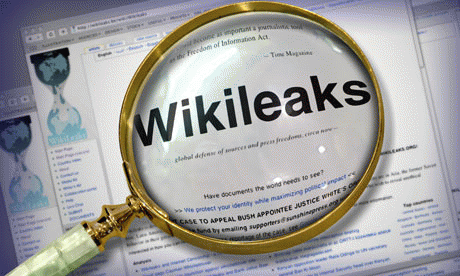The Roman satirist Juvenal asked his listeners in the Satires of Juvenal the question "Quid custodiet ipsos custodies?" - " Latin for "Who will guard the guardians?" Plato identified this problem as well in his famous work The Republic, in which Socrates describes the perfect society. For centuries the question attempted to explore where ultimate power and sovereignty should reside, and more importantly: the problem the answer on the question brought along. Because who would be in charge of scrutinizing those who are endowed with the ultimate power? Western democracy, with its checks and balances and Montesquieu's separation of powers, can be considered as that coming the closest to an answer on a seemably insolvable paradoxal dilemma of power and infinite regress. Yet it is definitely not an infallible response.
Over the past few weeks the tumultuous developments regarding the publication of the Embassy Cables, a series of documents from American Embassies and the American Ministry of State, created an embarrassing situation for the American government and a small diplomatic crisis on a global level. The website Wikileaks, founded by owner Julian Assange, published more than 250.000 documents containing internal diplomatic communications. To the dismay of leaders all over the world this information is now available for every person with Internet access. Immediately after the publication of the website - which refers to itself as a whistleblower - Interpol started a which-hunt for Julian Assange, who in August already was charged by Swedish authorities with rape.
The arrest of Assange, following the arrest warrant issued by Interpol in 188 countries, was the end of a temporary witch-hunt and most likely the beginning of years of legal tussling between British, Swedish and American authorities as Assange is arrested in England, charged in Sweden and wanted by the Americans. Yet the desperate search for the man behind Wikileaks displays signs of hypocrisy from the authorities worldwide, as Assange is merely the messenger of a message unwanted by those very same authorities. Without a doubt the revealing of the thousands of documents by Wikileaks brings the American government in an embarrassing situation, but its very own employees leaked the documents. Besides, in an era in which governance transparency, democracy and the 2.0-generation are the standard, one can ask whether the witch-hunt for Assange was not simply the result of a wish to silence a man revealing governance wrongs to the international public.
People have the right to know what their governments are up to and they have the right to know the wrongs committed by those in power, whether these be war crimes, flawed governance, corruption or other violations of the law. Those elected to office have a responsibility to serve and guard the people that elected them and to make sure that any violations of the law committed under their responsibility are properly responded to by the legal procedures designed for that. Yet as the documents provided to the world by Wikileaks have shown in the past, such responsibility has not always been taken.
To this extent, Wikileaks serves that function of guardian's guard already described by the brightest minds of the Classical antiquity. It completes an uncompleted part of the balance of power in modern society as it gives the people a possibility to control their "guards' and use public indignation and media exposure to denounce abuses.
But such a task is endowed with great responsibility too. In no means the guardian's guard should be able to relentlessly publish any information it runs into. This is where Wikileaks has crossed the line. No credit can be gained by publishing documents revealing targets around the world that the American government has labelled as sensitive for terrorist attacks. Such information concerns matters of national or international security and should not have been made accessible for the public. Wikileaks, or any other organization wishing to provide transparency to the people, should realize that it's task is to provide the world with information that teaches it about the wrongs committed by its leaders, not with information that could potentially endanger them. Furthermore, one can question the objected effect of releasing diplomatic files containing characterizations of world leaders by American diplomats. Naturally the media swiftly picked up these characterizations, which thereby enlarged the diplomatic crisis, but actually only articulated that what many people already thought. The publication of such documents can be considered as mere sensationalism. Those who possess the leaked documents can decide what to release and what not. There will often be a thin line between the two roads to be chosen from and therefore making such a choice requires great responsibility and strong integrity. It is questionable whether those running Wikileaks have these qualities.
And even if they do, again, we could ask: who guards this guardian's guard?





